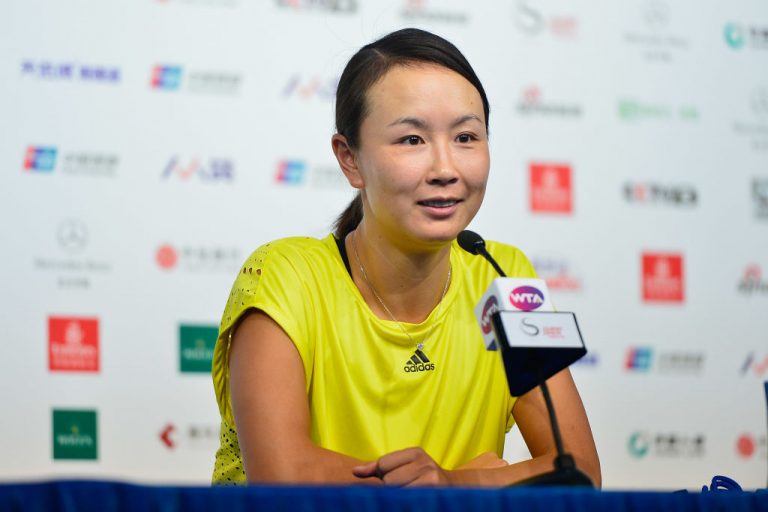When Chinese tennis star Peng Shuai accused former vice premier Zhang Gaoli of sexual assault on Nov. 2, authorities turned to a tried-and-true strategy of completely burying the allegations. At home, the country’s censors scrubbed away any mentions of the words “tennis” and “Peng Shuai” from China’s tightly controlled internet. Abroad, a few state-affiliated journalists focused on trying to quash concerns about Ms. Peng’s safety.
Peng described on her verified Weibo account that she had agreed to a consensual affair with the former top official around a decade ago. However, three years ago, when Zhang was retired, he allegedly invited her to his home and pressured her into sex.
Beijing’s propaganda toolbox reaches impasse
Presently, the Chinese Communist Party (CCP) seems to be relying on a two-pronged approach of maintaining silence on the accusations and waiting for the world to move on. The approach suggests that the country’s sprawling propaganda apparatus has limited options for shifting the public’s attention without drawing more attention to the allegations.
These tactics have worked for Beijing in the past, at least at home. In recent years, officials have relied on heavy censorship and a nationalistic narrative of Western meddling to deflect blame for issues such as the COVID-19 outbreak and reports of human rights abuse towards Muslim Uyghurs.
On Dec. 3, Chinese authorities released at a press event in Beijing a video showing a visibly malnourished Uyghur man with a shaved head, wearing an oversized uniform and speaking directly to the camera.
Success
You are now signed up for our newsletter
Success
Check your email to complete sign up
“I will try my best to change myself and receive leniency offered by the party and the government,” the man said, identified as Erkin Tursun, a former TV producer serving a 20-year sentence in Xinjiang on charges of “inciting ethnic hatred, ethnic discrimination and covering up crimes,” Reuters reported.
Tursun, almost unrecognisable from photos shared online before his 2018 arrest, was addressing his son, who now lives abroad and has publicly advocated against Tursun’s detention.
This time, with Peng’s accusations, the #MeToo movement has also been reignited in China as a lauded and well-known athlete coming forward to implicate a former party leader of sexual abuse is an extremely rare occurrence in the tightly censored nation.
Now, Beijing’s propaganda toolbox has seemingly hit a roadblock. Any new narrative would most likely have to acknowledge the allegations in the first place and require the approval of top leaders from The Politburo Standing Committee (PbSC), top decision-making body of the Communist Party.
Voices from home and abroad call for real updates on Peng
The Women’s Tennis Association (WTA) decided to end all tournaments in China over concerns surrounding Peng. WTA Chairman and CEO Steve Simon said in a statement released on Dec. 2 that with the “full support of the WTA Board of Directors,” all WTA tournaments in China, including Hong Kong, would be suspended immediately.
READ MORE:
WTA Officially Pulls Out of China Over Peng Shuai Disappearance
Simon added that “The WTA has been clear on what is needed here, and we repeat our call for a full and transparent investigation – without censorship – into Peng Shuai’s sexual assault accusation.”
On Nov. 17, CGTN published on its Twitter account what it claimed to be a copy of an email written by Peng addressing WTA Chairman Steve Simon. The statement recanted her sexual assault allegations against the 75-year-old retired official: “… the allegation of sexual assault, is not true.”
In response to what many believe to be a fabricated email, Simon said that “the statement released by Chinese state media concerning Peng Shuai only raises my concerns as to her safety and whereabouts.”
Hu Xinjin, editor-in-chief of the CCP-run tabloid Global Times, asked rhetorically on Twitter if “any girl could fake such a sunny smile while under pressure,” referring to international skepticism about the authenticity of photos released by Beijing to demonstrate Peng’s safety and freedom.
Richard McGregor, a senior fellow at the Lowy Institute in Australia and author of “The Party: The Secret World of China’s Communist Rulers,” told The New York Times on Nov. 30 that: “They have to placate not just the usual critics in the West, but also decidedly apolitical tennis stars and sporting associations overseas, while at the same time burying all mention of Ms. Peng’s original charge.”
Many of Peng’s colleagues in the tennis world have publicly shared their concerns for the Chinese star’s safety and well being. 18-time Grand Slam winner Chris Evert, a long-time friend of Peng’s, tweeted on Dec. 1 that she was proud of the WTA’s decision to suspend tournaments in China and that all focus should now be on finding Peng and making sure she is safe.
French tennis player Nicolas Mahut also shared, “The fact that Peng Shuai is missing is not only the [World Tennis Association]’s problem. “We are all concerned,” he said.














